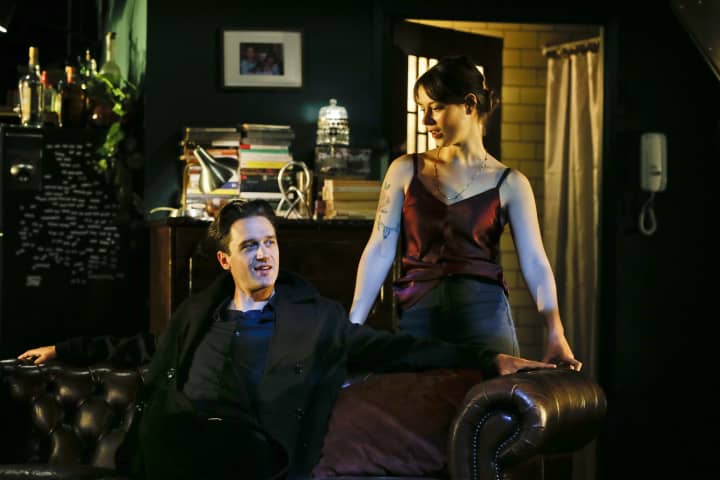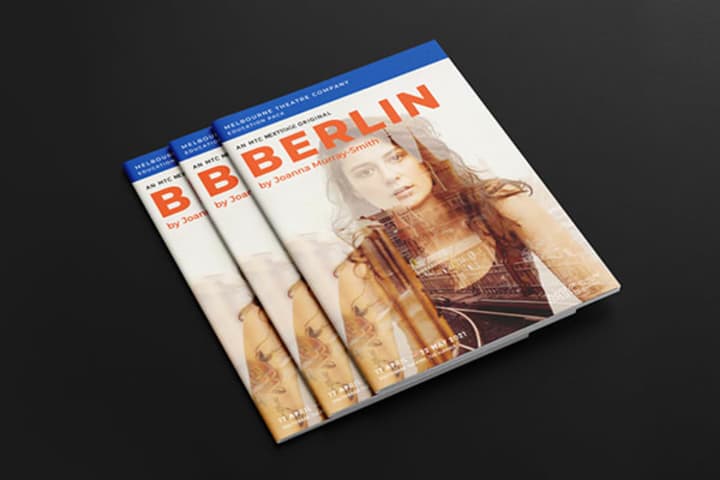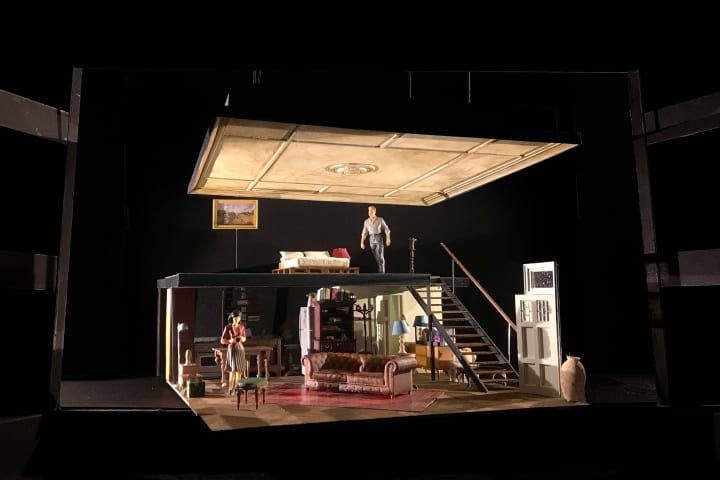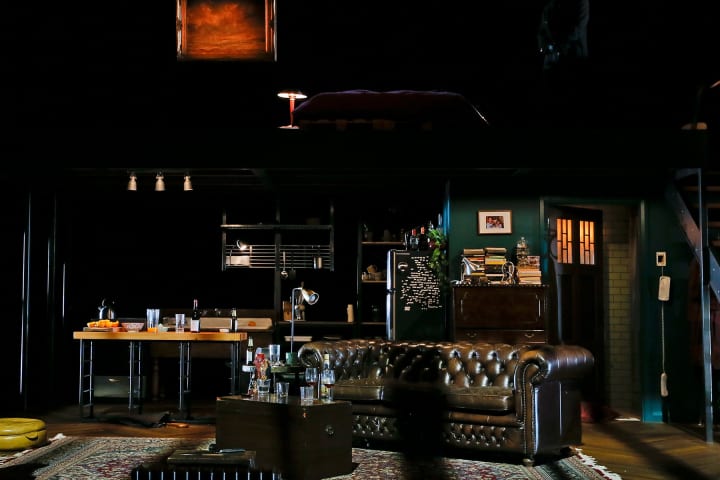Berlin is a big play, says Michael Wahr. He discusses its big ideas, how they relate to Australia in 2021, the German concept of Vergangenheitsbewältigun and how the German language helped him to love Shakespeare.
Berlin rehearsals began in March 2020. The prime minister had just restricted mass gatherings and major events but in those confusing days, we were perhaps all holding out hope that this would only last a few weeks. A few weeks became months and, almost a year to the day, the production team began again. ‘It’s so wonderful to be back in the room,’ says Michael Wahr during a break in rehearsals. ‘Partly it’s like “oh my god, I’ve forgotten how to do everything!” But at the same time it’s familiar and affirming: this is what I do.’
Wahr is playing Tom in Joanna Murray-Smith’s new work, an MTC NEXT STAGE Original. At first glance Berlin is the tale of two young lovers exploring their intense desire for each other over the course of one night, but there’s a lot more going on just beneath the surface. Wahr frequently refers to it as a ‘big’ play, meaning a play of big ideas, big themes. And those themes make it remarkably pertinent to Australia in 2021, despite its specific location in the German capital. ‘When I first read it,’ Wahr says, ‘I felt really excited that the [play focused on] stories and questions which I could relate to from a familial connection: Tom felt very much Australian in his discussions or opinions or his searching for identity, as a descendent of an immigrant from another culture.’
‘This play is two people with different experiences, seeing how vulnerable or invulnerable they can be; how affected they are by someone else’s thoughts or arguments or feelings or emotion, and how they change – or resolve to not change – because of that.’
The questions Wahr mentions relate to how a nation reconciles – or doesn’t – with its own past, and they are questions he feels haven’t been part of the Australian conversation, at least not in any significant way. But that may now be changing. ‘I think it’s a great time now in Australia to provocate these thoughts or questions related to issues that have gone almost taboo for years,’ he explains. ‘Or decades or generations even. And so it’s interesting to see now, at this point in Australia, how people are willing to engage or learn or be vulnerable in discussions. And that’s what the play is in a sense: it’s two people with different experiences, seeing how vulnerable or invulnerable they can be; how affected they are by someone else’s thoughts or arguments or feelings or emotion, and how they change – or resolve to not change – because of that.’
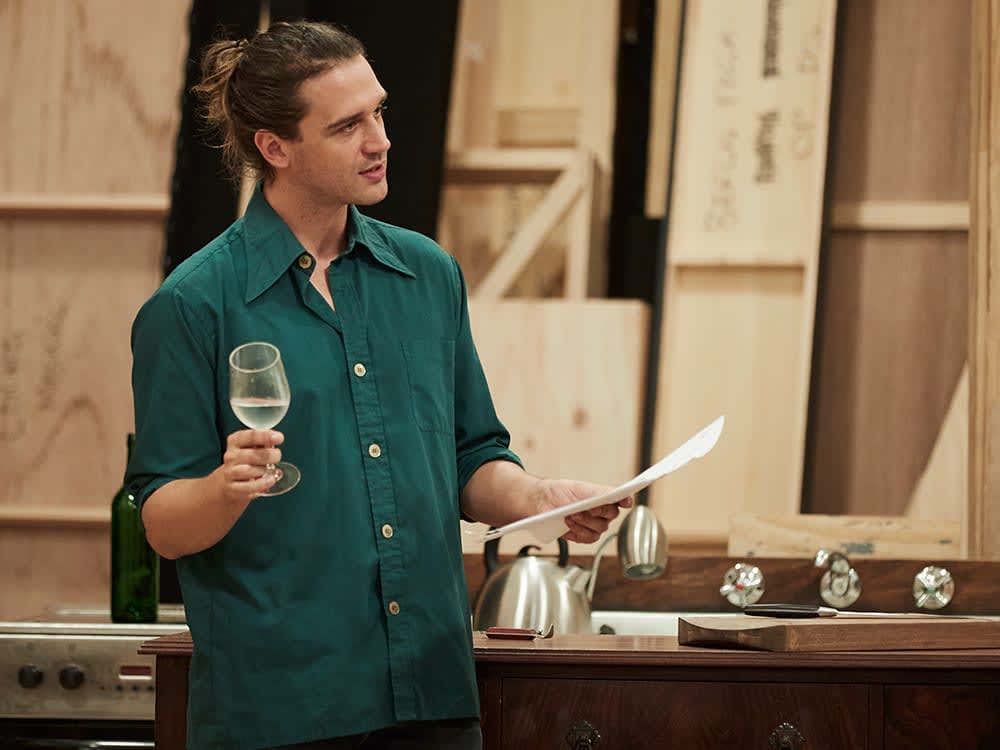
Michael Wahr rehearsing Berlin. Photo: Charlie Kinross
Wahr’s family is German. He speaks the language fluently. He suggests that these questions Australia is only now beginning to grapple with are similar to those that Germany has been having with itself since 1945. Echoing Joanna Murray-Smith’s acknowledgement that her inspiration for Berlin came from wondering what it would be like to ‘live in a city so engaged with its own historical crimes’ Wahr says that as a child of a German immigrant he too has often wondered what it would be like having ever-present memorials, like Berlin’s stolpersteine, in Australia; memorials to our darker history. ‘Going back to family in Germany and Austria and having these questions – everything is out there,’ he says, suggesting that there’s a stronger culture there of ‘being able to go through the hard stuff to learn. And to sit in it with patience, not “I don’t want to deal with this”. Hopefully this play sparks these questions in the back of people’s minds.’
Under the surface
Asked what excites him about Berlin, and what challenges him, Wahr reflects again on how big it is. ‘It’s such a big piece and as we delve deeper it’s not face value, it’s not just façade. It’s really hard to go back into the past, related to the Holocaust, related to German history and culture, Jewish history and culture, and what that connects to in Australian culture. It’s exhausting, but it needs to be done. So I guess the exciting and challenging thing is in those fight-or-flight moments of high intensity, where you think: this play is so big, but it’s a two hander.’
Wahr has publically talked about the German concept of Vergangenheitsbewältigung (roughly translated, ‘working through the past’) in an Australian context before, specifically around the growing debate over the appropriateness of 26 January as a date for celebrating Australia Day. The concept is ever present in Berlin. ‘That’s always the beauty of art,’ he muses, before paraphrasing Hamlet: ‘the job of an artist is to hold a mirror up to nature. And so in Berlin, over the course of one night you have two young people in a room, connecting, with Romeo and Juliet vibes – two star-crossed lovers from different households. And during that one night, just by watching and listening to their discussions, arguments, theories and justifications, we can correlate or reflect on our own attitudes or discussions or prejudices in this country.’
United by language
The actor’s references to Shakespeare are perhaps unsurprising. MTC audiences may be most familiar with Wahr from his title role in 2019’s Shakespeare in Love, but his career has been especially Bard-heavy. Indeed, he credits his love of Shakespeare with his decision to become an actor, recalling a production of Othello he saw when he was in primary school, and being particularly mesmerised by the magic of the retractable dagger.
‘I never felt like it was too hard or too complex or too boring. I think it aligns with German grammar: the placement of the verb at the end comes.’
He was also won over by the language, which he admits is unusual for someone so young. ‘There’s that play within Shakespeare’s stories that even as a young kid I was attracted to. And there’s something grammatically or structurally that disarmed me from a young age too. I never felt like it was too hard or too complex or too boring. I think it aligns with German grammar: the placement of the verb at the end comes,’ he jokes. ‘So often in Shakespeare’s writing, you see the movement of a verb to get the image first and then the action of the verb at the end, to propel it to the next thought. And so that’s always been a little bit of an affinity for me, because knowing German and speaking German I identified things in it where maybe others at my age wouldn’t have.’
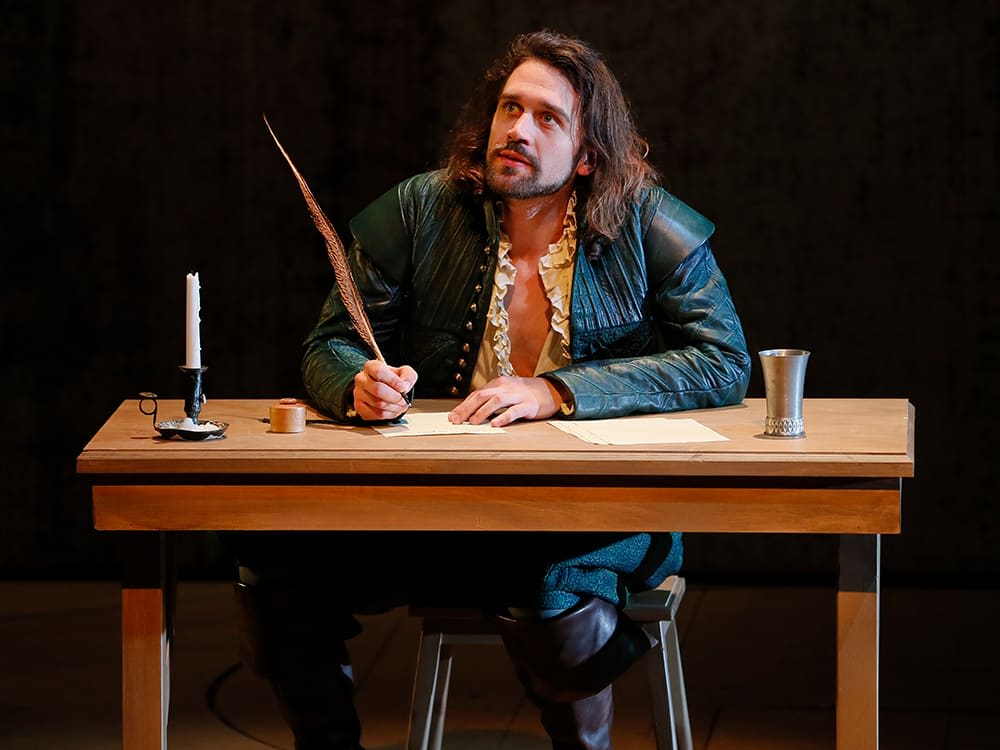
Michael Wahr as Will Shakespeare in Shakespeare in Love. Photo: Jeff Busby
His love was cemented in high school, when he played King Lear in a year 12 production. ‘We had this Dead Poets Society-style English teacher,’ he says, ‘who shaped so many people’s lives for the better’. The school always performed two plays every year, Wahr explains, and one of them was almost always a Shakespeare. ‘Those plays really instilled in me that it’s something that I love. And as I have grown up, this purpose has just grown stronger, this feeling of being where I was meant to be.’ He elaborates by way of an anecdote about his gynecologist mother: ‘I remember my mum coming home from surgery one day, at 8 or 9pm at night, and going “I had this really difficult case; there were complications and it was really difficult, and my back is aching. And I loved it!” And that’s what I’ve found in my career. Even when I’m knackered and my body is breaking, I just love it. So coming back into the room after a year away and being exhausted but still loving it? That’s all that matters.’
Berlin is on at Southbank Theatre from 17 April. Tickets on sale now.
Published on 16 April 2021

